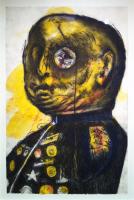 The notion of art as a vehicle for criticism and resistance was taken up in a programmatic manner by the South African group Resistance Art at the end of the nineteen-seventies to the end of confronting institutionalized racism in the then-totalitarian nation. A direct result of the 1976 Soweto uprising and the 1977 murder of the Black Consciousness leader Steve Biko, it represented a “galvanized anti-apartheid activism” in the artistic and cultural spheres. The idea of “culture as a weapon of political struggle,” affirmed by a multiethnic convocation of artists in Botswana in 1982, appears to be the overarching theme of the MOMA’s curators in the exhibition Impressions from South Africa, 1965 to Now, with an eye, perhaps, to those presently fomenting global crises and the sensibilities they must produce in an audience once again attuned to injustice and inequality (Image 1).
The notion of art as a vehicle for criticism and resistance was taken up in a programmatic manner by the South African group Resistance Art at the end of the nineteen-seventies to the end of confronting institutionalized racism in the then-totalitarian nation. A direct result of the 1976 Soweto uprising and the 1977 murder of the Black Consciousness leader Steve Biko, it represented a “galvanized anti-apartheid activism” in the artistic and cultural spheres. The idea of “culture as a weapon of political struggle,” affirmed by a multiethnic convocation of artists in Botswana in 1982, appears to be the overarching theme of the MOMA’s curators in the exhibition Impressions from South Africa, 1965 to Now, with an eye, perhaps, to those presently fomenting global crises and the sensibilities they must produce in an audience once again attuned to injustice and inequality (Image 1).
I'll visit
17.05.2011 | by Beatriz Leal Riesco
 When the Africans discovered that the mato inspired such horror in the Portuguese, they made it their habitual refuge, patiently negotiating from there with the intruders. Queen Njinga, in Angola, played this game to perfection, thus provoking the increasing anger of the Portuguese. Referring to the subterfuges the Portuguese governor opposed to the liberation of her sister, prisoner in Luanda, she wrote on 13 December 1655: “For these and other betrayals I took shelter in the matos, far from my territories” (Cadornega 1972, II: 501). By withdrawing to the forest, the queen was not only obeying a military imperative, but also putting pressure on the Portuguese.
When the Africans discovered that the mato inspired such horror in the Portuguese, they made it their habitual refuge, patiently negotiating from there with the intruders. Queen Njinga, in Angola, played this game to perfection, thus provoking the increasing anger of the Portuguese. Referring to the subterfuges the Portuguese governor opposed to the liberation of her sister, prisoner in Luanda, she wrote on 13 December 1655: “For these and other betrayals I took shelter in the matos, far from my territories” (Cadornega 1972, II: 501). By withdrawing to the forest, the queen was not only obeying a military imperative, but also putting pressure on the Portuguese.
To read
17.05.2011 | by Martín Lienhard
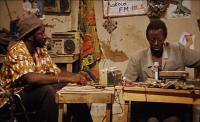 Even today, an analysis of the complex role of music in film is often forgotten by critics, many of whom remain prostrate before the dictatorship of the image. Yet as a manifestation of culture, music has a privileged position with respect to the study of representations of identity and ideology; moreover, in its subversive and dialogic aspects, it can reveal significant directorial decisions related to dynamics of power and exclusion.
Even today, an analysis of the complex role of music in film is often forgotten by critics, many of whom remain prostrate before the dictatorship of the image. Yet as a manifestation of culture, music has a privileged position with respect to the study of representations of identity and ideology; moreover, in its subversive and dialogic aspects, it can reveal significant directorial decisions related to dynamics of power and exclusion.
Afroscreen
16.05.2011 | by Beatriz Leal Riesco
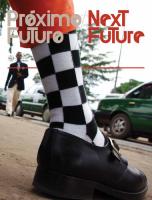 Since the 1960s, there has been great excitement in many African countries with the creation of art schools. Together with the first exhibitions of self-taught artists, there have also been the first festivals of black art, and even the work of African photographers has begun to establish a reputation for itself in Africa, in European countries and in some forums in the USA. The history of these artistic movements is already being written, describing their schools, their leading figures and their international impact.
Since the 1960s, there has been great excitement in many African countries with the creation of art schools. Together with the first exhibitions of self-taught artists, there have also been the first festivals of black art, and even the work of African photographers has begun to establish a reputation for itself in Africa, in European countries and in some forums in the USA. The history of these artistic movements is already being written, describing their schools, their leading figures and their international impact.
To read
11.05.2011 | by António Pinto Ribeiro
 The writer of '20 Navios' speaks to us of the chronicle and its melancholy, opening with “This (rear?) Window”, where he probes his identitary affiliations - the aforementioned triangle-: “From this window before me, when night falls, and Lisbon turns to dust beneath the anonymous city lights, I may imagine myself in Maputo, Havana, or Rio, or whatever other of my stomping grounds, but I know now that I can never fool myself, because I am inevitably alone, with my afro-latin schizophrenia.
The writer of '20 Navios' speaks to us of the chronicle and its melancholy, opening with “This (rear?) Window”, where he probes his identitary affiliations - the aforementioned triangle-: “From this window before me, when night falls, and Lisbon turns to dust beneath the anonymous city lights, I may imagine myself in Maputo, Havana, or Rio, or whatever other of my stomping grounds, but I know now that I can never fool myself, because I am inevitably alone, with my afro-latin schizophrenia.
Afroscreen
07.05.2011 | by Luís Carlos Patraquim
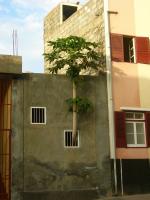 Body, consumption, sexuality, expression, festivity, communality and informality will be analyzed as the central places of the new challenges, negotiations and innovations of citizenship of contemporary young people in Cape Verde.
Body, consumption, sexuality, expression, festivity, communality and informality will be analyzed as the central places of the new challenges, negotiations and innovations of citizenship of contemporary young people in Cape Verde.
To read
01.05.2011 | by Filipe Martins
 The streets of Brazil are full of startling design solutions by ordinary people driven by pure human need. Adélia Borges writes about a new exhibition space that celebrates a design culture of diversity.
The streets of Brazil are full of startling design solutions by ordinary people driven by pure human need. Adélia Borges writes about a new exhibition space that celebrates a design culture of diversity.
I'll visit
28.04.2011 | by Adélia Borges
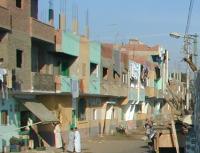 The virtual space of communication through social networks took part in the square’s new configuration, as in some way participated the space created by the window that we all opened. Even more determinant was the physical and real presence of the demonstrators and their capacity for resistance. The occupation of the square leads us to rethink public space, but the question that is imposed is what will then have to change so that Tahir Square can maintain the new configuration it conquered, a place of intervention, communication and meeting, and that it doesn’t go back to its old condition of museum space for tourists and road circulation?
The virtual space of communication through social networks took part in the square’s new configuration, as in some way participated the space created by the window that we all opened. Even more determinant was the physical and real presence of the demonstrators and their capacity for resistance. The occupation of the square leads us to rethink public space, but the question that is imposed is what will then have to change so that Tahir Square can maintain the new configuration it conquered, a place of intervention, communication and meeting, and that it doesn’t go back to its old condition of museum space for tourists and road circulation?
City
28.04.2011 | by Cristina Salvador
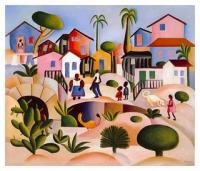 The most significant distinction in the way favela builders and architects treat space relates to temporality, since sheltering and inhabiting imply a completely different space-temporal process. It’s as if architects spatialized time, and favela builders temporalize space. This opposition becomes clear when we compare the way architects conceive space – always starting from a project, with spatial and formal projections for a near future – and the way favelas are built – where there is never a pre-established project, and the formal outline of the future construction begins to appear only when the construction process is well underway, and even then, it is never fixed or pre-defined as is the case of a traditional project.
The most significant distinction in the way favela builders and architects treat space relates to temporality, since sheltering and inhabiting imply a completely different space-temporal process. It’s as if architects spatialized time, and favela builders temporalize space. This opposition becomes clear when we compare the way architects conceive space – always starting from a project, with spatial and formal projections for a near future – and the way favelas are built – where there is never a pre-established project, and the formal outline of the future construction begins to appear only when the construction process is well underway, and even then, it is never fixed or pre-defined as is the case of a traditional project.
City
27.04.2011 | by Paola Bernstein Jacques
 Why am I not black. Or rather, how did I end up a Mozambican?
These questions about identity are normal. They come up more often when I’m not in Mozambique due to (I assume) lack of historical knowledge. But what does a Mozambican look like? Mozambique, as a nation, didn’t exist until 1975. It was then it was born, a carrier of other nations within its borders, of ethnicities as varied as Shangana, Makonde, descendants from Swahili and Arabs from the North, descendants from Goan, Pakistani, Portuguese, Ronga and so on. With that new country came a new nationality — Mozambican.
Why am I not black. Or rather, how did I end up a Mozambican?
These questions about identity are normal. They come up more often when I’m not in Mozambique due to (I assume) lack of historical knowledge. But what does a Mozambican look like? Mozambique, as a nation, didn’t exist until 1975. It was then it was born, a carrier of other nations within its borders, of ethnicities as varied as Shangana, Makonde, descendants from Swahili and Arabs from the North, descendants from Goan, Pakistani, Portuguese, Ronga and so on. With that new country came a new nationality — Mozambican.
Face to face
27.04.2011 | by Rui Tenreiro
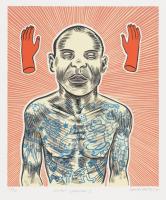 ost-independence Africa is a space of ambivalence, where the aspirations of her people are, ever so often, opposed by her own leaders and by influences from the outside. Her wealth is largely crippled by the West’s use of financial control to make the continents resources available to its own ends. And in recent years, China’s rapidly intensifying economic influence in Africa has become yet another reminder of a new global actor that feeds on globalization and the resultant economic and political expansion, and who has not shied away from reaching out its tentacles to areas troubled by conflict and weak governance. In this conflicting terrain, we must carry with us the words of Walter Benjamin: “The tradition of the oppressed teaches us that the “state of emergency” in which we live is not an exception but a rule.”
ost-independence Africa is a space of ambivalence, where the aspirations of her people are, ever so often, opposed by her own leaders and by influences from the outside. Her wealth is largely crippled by the West’s use of financial control to make the continents resources available to its own ends. And in recent years, China’s rapidly intensifying economic influence in Africa has become yet another reminder of a new global actor that feeds on globalization and the resultant economic and political expansion, and who has not shied away from reaching out its tentacles to areas troubled by conflict and weak governance. In this conflicting terrain, we must carry with us the words of Walter Benjamin: “The tradition of the oppressed teaches us that the “state of emergency” in which we live is not an exception but a rule.”
To read
25.04.2011 | by Stina Edblom
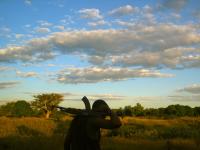 In the country with a Kalashnikov in its flag we were walking a long way to meet a musician and record some of his tunes for the soundtrack to a documentary. Tobias Dzandiwandira is a practically unknown talent, for he lives with his large family an hour and a half away from the nearest road in Mozambique’s centre-west, close to the border with Zimbabwe.
In the country with a Kalashnikov in its flag we were walking a long way to meet a musician and record some of his tunes for the soundtrack to a documentary. Tobias Dzandiwandira is a practically unknown talent, for he lives with his large family an hour and a half away from the nearest road in Mozambique’s centre-west, close to the border with Zimbabwe.
I'll visit
21.04.2011 | by Nuno Milagre
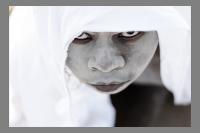 Mário Macilau is a photographer (of fragments) of reality. Macilau is a teller of stories and as he narrates he meditates through his images on the social, political and economic environment in his country and in the world, which he explores in its unfeigned naked and raw form. As he states himself, he does not stage or create the photographic moment. His images are instantaneous. He does not seek them, he finds them. Camera in hand, he approaches the countless anonymous people who appear in his work – it is the movement of contemporary man and his relationship with space that interest him.
Mário Macilau is a photographer (of fragments) of reality. Macilau is a teller of stories and as he narrates he meditates through his images on the social, political and economic environment in his country and in the world, which he explores in its unfeigned naked and raw form. As he states himself, he does not stage or create the photographic moment. His images are instantaneous. He does not seek them, he finds them. Camera in hand, he approaches the countless anonymous people who appear in his work – it is the movement of contemporary man and his relationship with space that interest him.
Face to face
11.04.2011 | by Sílvia Vieira
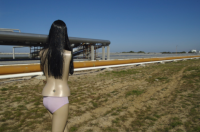 Interview carried out by online chat, at various times and on various days, punctuated by continual breaks in the Internet connection that maps out the transatlantic and ex-colonial triangulation between Luanda, Angola – Kiluanji Kia Henda’s home, a city that I have never visited; São Paulo, Brazil – my temporary home and the place where I first met Kiluanji, a place that is close to the origin of the series presented here; Lisbon, Portugal – my permanent home, source of the schedule drawn up by my computer and Kiluanji’s ex-temporary home.
Interview carried out by online chat, at various times and on various days, punctuated by continual breaks in the Internet connection that maps out the transatlantic and ex-colonial triangulation between Luanda, Angola – Kiluanji Kia Henda’s home, a city that I have never visited; São Paulo, Brazil – my temporary home and the place where I first met Kiluanji, a place that is close to the origin of the series presented here; Lisbon, Portugal – my permanent home, source of the schedule drawn up by my computer and Kiluanji’s ex-temporary home.
Face to face
08.04.2011 | by Lígia Afonso
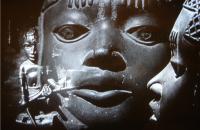 Documentary cinema in Africa more or less follows the same trajectory as African Literature. The methodologies and forms of expression are certainly different but the discourse on Africa remains the same, evolving with the continent’s history. In the 1920s, colonial reportage and ethnographic films were already a success. Africa and Africans were filmed subjects.
Documentary cinema in Africa more or less follows the same trajectory as African Literature. The methodologies and forms of expression are certainly different but the discourse on Africa remains the same, evolving with the continent’s history. In the 1920s, colonial reportage and ethnographic films were already a success. Africa and Africans were filmed subjects.
Afroscreen
08.04.2011 | by Rufin Mbou Mikima
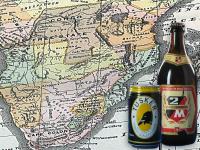 We decided to stick around for a beer at the end of a shooting day for the movie “The Hero” directed by Zezé Gamboa. We were on the Island of Luanda, where we had filmed from two in the afternoon to one in the morning. We stopped the car next to a stand, leaving the door open to keep listening to the pirated cassette playing on the car radio. In the group, the Angolans drink imported beer, Super Bock; the foreigners drink national beer, Cuca, each one savouring the exotic freshness of its own point of view while we talk in the shadow of a tranquil weekday dawn.
We decided to stick around for a beer at the end of a shooting day for the movie “The Hero” directed by Zezé Gamboa. We were on the Island of Luanda, where we had filmed from two in the afternoon to one in the morning. We stopped the car next to a stand, leaving the door open to keep listening to the pirated cassette playing on the car radio. In the group, the Angolans drink imported beer, Super Bock; the foreigners drink national beer, Cuca, each one savouring the exotic freshness of its own point of view while we talk in the shadow of a tranquil weekday dawn.
I'll visit
03.04.2011 | by Nuno Milagre
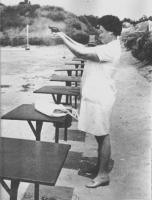 The air erodes
Its shadow quivers
My land is lost sand
My skin a black target
A rough weave of laments
How could anyone believe that a mother
is anything but love?
The air erodes
Its shadow quivers
My land is lost sand
My skin a black target
A rough weave of laments
How could anyone believe that a mother
is anything but love?
Mukanda
16.03.2011 | by Céléstin Monga
 Passando tempo no mercado, a Feira do Ponto da cidade de São Tomé, Olavo pintou várias séries de quadros com vendedoras. Falava com elas enquanto desenhava esboços, retratou-as na sua vida pública de trabalho. Na tela, as mulheres, cestos e bacias à cabeça, crianças nas costas, a luta diária: ganhar a vida, cuidar da família. O confronto com a vivência quotidiana das vendedoras sobrepôs-se ao seu impacto figurativo e os contornos das mulheres emanciparam-se para delinear os estreitos corredores do mercado. As mulheres moldaram-se nos trajectos repisados por elas todos os dias, e mais tarde os trajectos devolveram-se às mulheres na multiplicidade dos seus caminhos interiores, mais extensos e complexos.
Passando tempo no mercado, a Feira do Ponto da cidade de São Tomé, Olavo pintou várias séries de quadros com vendedoras. Falava com elas enquanto desenhava esboços, retratou-as na sua vida pública de trabalho. Na tela, as mulheres, cestos e bacias à cabeça, crianças nas costas, a luta diária: ganhar a vida, cuidar da família. O confronto com a vivência quotidiana das vendedoras sobrepôs-se ao seu impacto figurativo e os contornos das mulheres emanciparam-se para delinear os estreitos corredores do mercado. As mulheres moldaram-se nos trajectos repisados por elas todos os dias, e mais tarde os trajectos devolveram-se às mulheres na multiplicidade dos seus caminhos interiores, mais extensos e complexos.
Face to face
15.03.2011 | by Nuno Milagre
 While it is true that African art largely takes place in the Northern hemisphere, and while its major (political, financial, philosophical, aesthetic etc.) advances have taken place here, it is true that the African continent is increasingly asserting itself as an exceptional relational space for cultural agents.
While it is true that African art largely takes place in the Northern hemisphere, and while its major (political, financial, philosophical, aesthetic etc.) advances have taken place here, it is true that the African continent is increasingly asserting itself as an exceptional relational space for cultural agents.
Face to face
28.02.2011 | by Marta Mestre
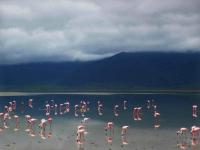 Here in Ngorongoro, the flamingos spread across the lake’s low waters, walk erratic steps and peck the mud with greed. Reflections of the flamingos and of the sky, punctuated by clouds, paint the water in blue, rose and white. The wind disperses the clouds ceasing their self-admiration on the mirror; the afternoon is going to heat up.
In northern Tanzania, West of the Kilimanjaro and on the way to the famous Serengeti National Park, exists one of the bigger cauldrons in the world: the Crater of Ngorongoro.
Here in Ngorongoro, the flamingos spread across the lake’s low waters, walk erratic steps and peck the mud with greed. Reflections of the flamingos and of the sky, punctuated by clouds, paint the water in blue, rose and white. The wind disperses the clouds ceasing their self-admiration on the mirror; the afternoon is going to heat up.
In northern Tanzania, West of the Kilimanjaro and on the way to the famous Serengeti National Park, exists one of the bigger cauldrons in the world: the Crater of Ngorongoro.
I'll visit
22.02.2011 | by Nuno Milagre